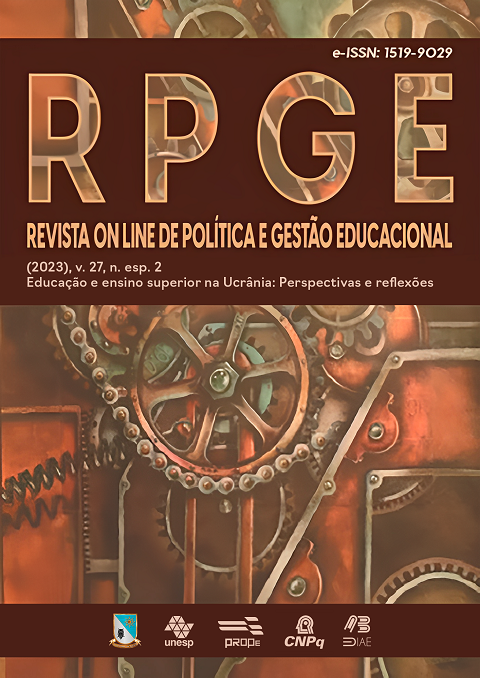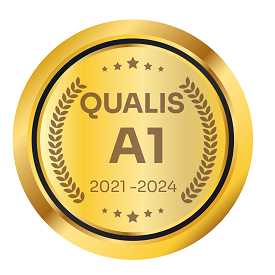Sobre la cuestión de la mejora del nivel de competencia comunicativa de los estudiantes de enseñanza superior en las clases de lenguas extranjeras
DOI:
https://doi.org/10.22633/rpge.v27iesp.2.18384Palabras clave:
Plataformas en línea, Competencia comunicativa, Aprendizaje a distancia, Lenguas extranjerasResumen
El objetivo del artículo es analizar los métodos para aumentar el nivel de competencia comunicativa de los estudiantes de enseñanza superior en las clases de lenguas extranjeras. La investigación se basa en el método sistemático, el análisis comparativo y la abstracción, así como en la aplicación del método dialéctico y la predicción. Los resultados investigan el problema de la competencia comunicativa en las condiciones modernas de enseñanza (análisis de principios generales y observaciones). También se presta especial atención a las cuestiones de los métodos modernos para aumentar el nivel de competencia comunicativa de los estudiantes de enseñanza superior en las clases de lenguas extranjeras. Las conclusiones apuntan a la eficacia de las plataformas en línea (Futureleam, Puzzle-English, Skyeng, Duolingo, Lingualeo y otras) y a la importancia del trabajo minucioso en las clases de lenguas extranjeras.
Descargas
Citas
ABD-RABO, A.; HASHAIKEH, S. The digital transformation revolution. International Journal of Humanities and Educational Research, v. 3, n. 4, p. 124-128, 2021. DOI: 10.47832/2757-5403.4-3.11.
AHNAGARI, S.; ZAMANIAN, J. Intercultural Communicative Competence in Foreign Language Classroom. International Journal of Academic Research in Business and Social Sciences, v. 4, n. 11, 2014. DOI: 10.6007/ijarbss/v4-i11/1265.
ARAUJO PORTUGAL, J. Intercultural communicative competence in foreign language learning. Global Journal of Foreign Language Teaching, v. 11, n. 4, p. 243-256, 2021. DOI: 10.18844/gjflt.v11i4.6006.
BAHLAI, O. et al. Developing students’ intercultural communicative competence in foreign language classroom. Advanced Education, v. 6, n. 11, p. 55-59, 2019. DOI: 10.20535/2410-8286.158078.
EZHIL MARY, S.; NIRMALA, J. R. Communicative Language Teaching Enhances Communicative Competence. In: ANNUAL INTERNATIONAL CONFERENCE ON LANGUAGE, LITERATURE & LINGUISTICS, 1., 2012, Singapore. Proceedings […]. [S. l.]: Global Science & Technology Forum (GSTF), 2012. DOI: 10.5176/2251-3566_l312166.
HAIDABRUS, B. Information technology and management in higher education and science. Futurity Education, v. 2, n. 4, p. 26–35, 2022. DOI: 10.57125/FED.2022.25.12.03.
HALIAN, I. et al. Communicative Competence in Training Future Language and Literature Teachers. Revista Amazonia Investiga, v. 9, n. 29, p. 530-541, 2020. DOI: 10.34069/ai/2020.29.05.58.
HORDIICHUK, O. et al. Analysis of models of inclusive education in European countries (experience for Ukraine). Eduweb, v. 16, n. 4, p. 32-41, 2022. DOI: 10.46502/issn.1856-7576/2022.16.04.3.
JÄRVIS, M.; TAMBOVCEVA, T.; VIROVERE, A. Scientific innovations and advanced technologies in higher education. Futurity Education, v. 1, n. 1, p. 13–22, 2021. DOI: 10.57125/FED.2022.10.11.2.
KHARITONENKO, L. Analysis of innovative methods of Ukrainian language teaching at the educational institutions of general secondary education. Futurity Education, v. 2, n. 2, p. 52–64, 2022. DOI: 10.57125/FED.2022.25.06.6.
KOSTYRYA, I. et al. Intercultural Communication Skills as an International Tool for the Development of English-Language Communicative Competencies. Journal of Curriculum and Teaching, v. 11, n. 6, p. 30, 2022. DOI: 10.5430/jct.v11n6p30.
MARTINEZ-NUÑEZ, M.; BORRAS-GENE, O.; FIDALGO-BLANCO, Á. Virtual Learning Communities in Google Plus, Implications, and Sustainability in MOOCs. Journal of Information Technology Research, v. 9, n. 3, p. 18-36, 2016. DOI: 10.4018/jitr.2016070102.
NAMAZIANDOST, E. et al. Implementing a flipped model of instruction in the EFL listening classroom: Impact on comprehension. Journal on English as a Foreign Language, v. 10, n. 2, p. 385-401, 2020. DOI: 10.23971/jefl.v10i2.2065.
NARKE, P. Communicative Strategies as a Tool for Assessing Spoken Interactional Competence. In: NARKE, P. Task-Based Language Teaching and Assessment. Singapore: Springer Singapore, 2021. p. 249-274. ISBN 9789811642258. DOI: 10.1007/978-981-16-4226-5_13.
PODGÓRECKI, J.; ROPSKI, J. Communicative competence. Historical and social-educational ideas, v. 7, n. 6/1, p. 173-178, 2015. DOI: 10.17748/2075-9908-2015-7-6/1-173-178.
VASYLYSHYNA, N. The foreign-language communicative competence grounds of master course students. Scientific bulletin of South Ukrainian National Pedagogical University named after K. D. Ushynsky, v. 1, n. 130, p. 114-119, 2020. DOI: 10.24195/2617-6688-2020-1-15.
Descargas
Publicado
Cómo citar
Número
Sección
Licencia
Derechos de autor 2023 Revista on line de Política e Gestão Educacional

Esta obra está bajo una licencia internacional Creative Commons Atribución-NoComercial-CompartirIgual 4.0.
Manuscritos aceitos e publicados são de propriedade da Revista on line de Política e Gestão Educacional. É vedada a submissão integral ou parcial do manuscrito a qualquer outro periódico. A responsabilidade do conteúdo dos artigos é exclusiva dos autores. É vedada a tradução para outro idioma sem a autorização escrita do Editor ouvida a Comissão Editorial Científica.











